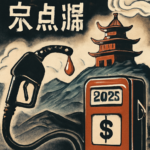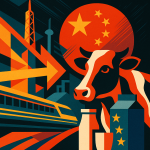EU sanctions on Chinese companies are front and center in China–EU trade tensions today.
Key Points
- EU’s 19th round: Ōuzhōu 欧盟’s 19th round of sanctions for the first time targets large Chinese refineries and petroleum trading firms.
- Official reaction: Shangwùbù 商务部 expressed strong dissatisfaction and resolute opposition, saying the EU acted unilaterally despite China’s warnings.
- Business impact: Increased policy risk for energy and trading firms, with likely reputational and operational constraints in EU-linked markets.
- Geopolitical risk & response: Zhōngguó 中国 warns it will take necessary measures to protect energy security and the legitimate and lawful rights of companies, arguing the measures lack Liánhéguó 联合国 authorization.

Source: Ministry of Commerce (Shangwùbù 商务部)
Quick summary: EU sanctions on Chinese companies — the headline
The European Union (Ōuzhōu 欧盟) announced a 19th round of sanctions on Russia on October 23 that for the first time includes large Chinese refineries and petroleum trading firms.

Find Top Talent on China's Leading Networks
- Post Across China's Job Sites from $299 / role
- Qualified Applicant Bundles
- One Central Candidate Hub
Your First Job Post Use Checkout Code 'Fresh20'

Question
On October 23, the European Union (Ōuzhōu 欧盟) announced that, in its 19th round of sanctions on Russia, it had added several Chinese companies to its list and for the first time sanctioned large Chinese refineries and petroleum trading firms.
What is China’s comment on this move?

ExpatInvest China
Grow Your RMB in China:
- Invest Your RMB Locally
- Buy & Sell Online in CN¥
- No Lock-In Periods
- English Service & Data
- Start with Only ¥1,000

Answer — Official reaction from the Ministry of Commerce (Shangwùbù 商务部)
The Ministry of Commerce (Shangwùbù 商务部) said the European Union disregarded China’s multiple representations and warnings and acted unilaterally.
In this 19th sanctions package the EU again placed Chinese companies on its list and, for the first time, imposed sanctions on major Chinese refineries and oil traders.
China expresses strong dissatisfaction and resolute opposition to this action.
China has consistently opposed unilateral sanctions that lack basis in international law and are not authorized by the United Nations (Liánhéguó 联合国).
The EU’s actions run counter to the spirit of consensus reached by China (Zhōngguó 中国) and EU leaders, seriously undermining the overall framework of China–EU economic and trade cooperation and disrupting global energy security.
China urges the EU to immediately stop listing Chinese companies and not to continue down this mistaken path.
China will take necessary measures to firmly safeguard the legitimate and lawful rights and interests of Chinese enterprises, and will resolutely protect its energy security and economic development.

Resume Captain
Your AI Career Toolkit:
- AI Resume Optimization
- Custom Cover Letters
- LinkedIn Profile Boost
- Interview Question Prep
- Salary Negotiation Agent

What this means — concise takeaways for investors, founders, techies, and marketers
- Policy risk just increased for Chinese energy and trading firms.
- Diplomatic friction could ripple into broader China–EU economic ties.
- Companies named may face reputational and operational constraints in EU-linked markets.
- China signals it will use countermeasures to protect energy security and corporate interests.

Context and relevance — why this matters now
Sanctions are primarily a geopolitical tool, and placing major refineries and petroleum trading firms onto a list raises the stakes in global energy markets.
China’s public statement stresses two legal and diplomatic themes:
- Opposition to unilateral measures — China frames the EU’s move as lacking a United Nations (Liánhéguó 联合国) mandate.
- Harm to economic cooperation — Beijing warns the move will damage the broader China–EU economic framework.

Practical implications — what stakeholders should watch
- Investors: Watch equity and credit risk for affected energy companies and trading houses.
- Founders & startups: Expect possible tightening of cross-border trade flows and due diligence standards in energy-related supply chains.
- Techies: Sanctions can accelerate demand for compliance tooling and trade-screening software.
- Marketers & growth teams: Communication strategies for Chinese enterprises with international customers will need to emphasize legal compliance and continuity of supply.

Recommended steps — tactical next moves
- For companies on or near sanction lists: Prepare legal defenses, audit international contracts, and map exposure to EU financial and logistic networks.
- For investors: Reassess exposure to China-linked energy traders and refineries and model scenario impacts on revenue and access.
- For policymakers and diplomats: Push for clear channels of communication and consider multilateral frameworks to address energy security concerns.

Search & linking opportunities
Use anchor text like “EU sanctions on Chinese companies” and “China–EU energy security” when linking to analysis or regulatory updates.
Include links to official pages such as the Ministry of Commerce (Shangwùbù 商务部) and the European Council sanctions page for authority and verification.

Bottom line
The EU’s 19th round of sanctions has escalated tensions by listing Chinese refineries and petroleum traders, and China has publicly warned it will protect the rights of its companies and its energy security.
EU sanctions on Chinese companies






